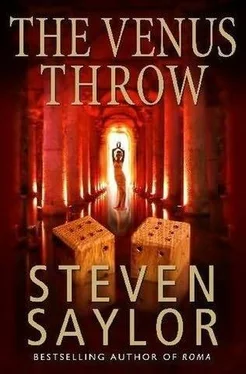Steven Saylor - The Venus Throw
Здесь есть возможность читать онлайн «Steven Saylor - The Venus Throw» весь текст электронной книги совершенно бесплатно (целиком полную версию без сокращений). В некоторых случаях можно слушать аудио, скачать через торрент в формате fb2 и присутствует краткое содержание. Жанр: Исторический детектив, на английском языке. Описание произведения, (предисловие) а так же отзывы посетителей доступны на портале библиотеки ЛибКат.
- Название:The Venus Throw
- Автор:
- Жанр:
- Год:неизвестен
- ISBN:нет данных
- Рейтинг книги:3 / 5. Голосов: 1
-
Избранное:Добавить в избранное
- Отзывы:
-
Ваша оценка:
- 60
- 1
- 2
- 3
- 4
- 5
The Venus Throw: краткое содержание, описание и аннотация
Предлагаем к чтению аннотацию, описание, краткое содержание или предисловие (зависит от того, что написал сам автор книги «The Venus Throw»). Если вы не нашли необходимую информацию о книге — напишите в комментариях, мы постараемся отыскать её.
The Venus Throw — читать онлайн бесплатно полную книгу (весь текст) целиком
Ниже представлен текст книги, разбитый по страницам. Система сохранения места последней прочитанной страницы, позволяет с удобством читать онлайн бесплатно книгу «The Venus Throw», без необходимости каждый раз заново искать на чём Вы остановились. Поставьте закладку, и сможете в любой момент перейти на страницу, на которой закончили чтение.
Интервал:
Закладка:
"If he wants to keep his hand in the contest," said Meto, absently reaching for his short sword and fiddling with the handle, "Crassus will need to wrangle another military command from the Senate and score some victories to impress the people. Silver buys votes, but only glory buys greatness." I wondered if these words came from Meto himself or from Caesar, whose finances become more precarious even while the list of his conquests grows longer.
"But Pompey has pacified the East, and now Caesar is pacifying Gaul," said Eco. "What's left for Crassus?"
"He'll simply have to look further afield," said Meto.
"Well, Egypt is as far as I care to cast my thoughts," I said, and proceeded to relate what I had learned from Dio on the night before I left Rome. From his proximity to Caesar and his staff, Meto already knew a little about the murders of the Alexandrian envoys, but had not realized the scale of the scandal. He seemed genuinely appalled, and I found myself wondering how someone who had become so inured to the carnage of battle could be alarmed any longer by mere murder. The thought made me uneasy, as I suddenly felt the growing distance between Meto and myself. Then, as I continued to describe the peculiar circum-stances of Dio's visit and my guests' absurd disguises-the philosopher as a woman, the gallus as a man — Meto burst out laughing. His laughter encouraged me to pile on more details, which made him laugh all the harder. Suddenly the stubbly jaw and the bloodstains faded from my sight. The harrowing tales and the crude soldier's slang were forgotten. I saw the face of the laughing little boy I had adopted years ago, and found what I had come searching for.
As it turned out, Eco and I were gone from Rome for almost a month, and did not return until after the Ides of Februarius. First a snowstorm detained us. Then I fell ill with a cough in my chest. Then, just as I was well enough to travel, Belbo fell ill with the same complaint. While some men might scoff at postponing a trip to coddle a slave, it made no sense to me to go traveling over dangerous back roads with a sick body-guard. Besides, I welcomed the excuse to spend more time with Meto.
On the way back, we happened to cross the Adriatic using the same intrepid boatman and in the same boat as before. I had no trouble getting Eco to pause for a few moments in the temple of Fortune before we set sail. Happily for our crossing, the sky was clear and the waters were calm.
Back in Rome, Bethesda seemed to be in considerably better spirits than when I had left. Indeed, her attentions to me on the night of my return could have stopped the heart of a weaker man. Once there had been a time when a month's separation was enough to build our appetites for each other to a ravenous pitch; I had thought those days were long gone, but on that night Bethesda managed to make me feel more like a youth of twenty-four than a bearded grandfather of fifty-four. Despite the aches and pains of the previous days' long hours on horseback, I arose the next morning in excellent spirits.
As we ate our breakfast of Egyptian flat bread and millet porridge with raisins, Bethesda caught me up on the latest gossip. I sipped at a cup of heated honeyed wine and listened with only half an ear as she explained that the miserly senator across the way was finally putting a new roof on his house, and that a group of Ethiopian prostitutes appeared to have taken up residence at the home of a rich widower who keeps an apartment up the street. When she turned to affairs down in the Forum, I paid closer attention.
Bethesda had a soft spot for our handsome young neighbor Marcus Caelius, the one whom I had run into on the night before my departure. According to Bethesda, Caelius had just finished prosecuting a case which had set the city abuzz.
"I went down to watch," she said.
"Really? Th e trial, or the prosecutor?"
"Both, of course. And why not?" She became defensive. "I know quite a lot about trials and the law, having lived with you so long."
"Yes, and Marcus Caelius is exceptionally good-looking when he gets himself all wound up with an exciting oration-eyes flashing, veins bulging on his forehead and neck… "
Bethesda seemed about to respond, but thought better of it and stared at me straight-faced.
"A prosecution," I finally said.
"Against whom?"
"Someone called Bestia."
"Lucius Calpurnius Bestia?"
She nodded.
"You must be mistaken," I said, with a mouth full of millet. "I think not." Her expression became aloof.
"But Caelius supported old Bestia for the praetorship last fall. They're political allies." "Not any longer."
This was entirely credible, given Caelius's reputation for fickleness, both in love and politics. Even when he was publicly allied with a candidate or cause, one could never be quite sure of his real intentions. "On what charge did he prosecute Bestia?"
"Electoral bribery."
"Ha! In the fall he campaigns for Bestia, and in the spring he tries the man for illegal campaigning. Roman politics!" I shook my head.
"Who defended?"
"Your old friend Cicero."
"Oh, really?"
This added a new wrinkle to the matter. Marcus Caelius had made his entry into public life as Cicero's pupil and protege. Then, during the turmoil of Catilina's revolt, he parted ways with his mentor-or perhaps he only pretended to do so, in order to spy for Cicero. Throughout that tumultuous episode, Caelius's real allegiance remained a mystery, at least to me. Afterward, Caelius left Rome for a year of government service in Africa. On his return he seemed to have left the camp of his old mentor for good, going up against Cicero in court and actually getting the better of the master orator. Later, when the Senate exiled Cicero and his enemies went on a rampage and destroyed Cicero's beautiful house on the Palatine, it was my neighbor Marcus Caelius who came knocking at my door with the news-complaining that the windows of his apartment afforded no view and asking if he could watch the flames from my balcony! The way the lurid glow danced on his handsome face, it was impossible to tell whether Caelius was appalled or amused, or perhaps a little of both.
After much political wrangling, the Senate had recalled Cicero from exile, and he was back in Rome. His house on the Palatine was being rebuilt. And now, according to Bethesda, he had again matched wits in a court of law with his one-time pupil Marcus Caelius.
"Well, don't keep me in suspense," I said. "How did the case come
out?"
"Cicero won," Bethesda said. "Bestia was acquitted. But Caelius says the jury was bribed and vows that he's going to prosecute Bestia again."
I laughed. "Tenacious, isn't he? Having once defeated Cicero in court, I imagine he simply can't stand being bested by his old teacher this time. Or did a single speech not suffice for Caelius to adequately slander Bestia?"
"Oh, for that purpose I think the speech did very well."
"Full of venom?"
"Dripping with it. In his summation Caelius brought up the death last year of Bestia's wife, and the death of his previous wife before that. He practically accused Bestia of poisoning them."
"Murdering one's wives can't have much to do with electoral brib-
ery."
"Perhaps not, but the way Caelius brought it up, it seemed entirely appropriate."
"Character assassination," I said, "is the cornerstone of Roman jurisprudence. The prosecutor uses any means possible to destroy the accused's reputation, to make it seem more likely that he's committed whatever crime he's accused of. It's so much easier than producing actual evidence. Then the defender does the same thing in reverse, accusing the accusers of various abominations to destroy their credibility. Strange, to think that once upon a time I actually had a certain amount of respect and even admiration for advocates. Yes, well, I've heard the rumors that Bestia did his wives in. Both died relatively young, with no preceding illness and without a mark on them, so naturally people say he poisoned them, though even poison usually leaves some evidence."
Читать дальшеИнтервал:
Закладка:
Похожие книги на «The Venus Throw»
Представляем Вашему вниманию похожие книги на «The Venus Throw» списком для выбора. Мы отобрали схожую по названию и смыслу литературу в надежде предоставить читателям больше вариантов отыскать новые, интересные, ещё непрочитанные произведения.
Обсуждение, отзывы о книге «The Venus Throw» и просто собственные мнения читателей. Оставьте ваши комментарии, напишите, что Вы думаете о произведении, его смысле или главных героях. Укажите что конкретно понравилось, а что нет, и почему Вы так считаете.










